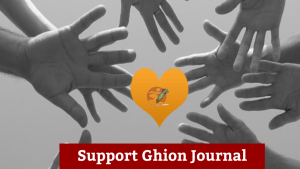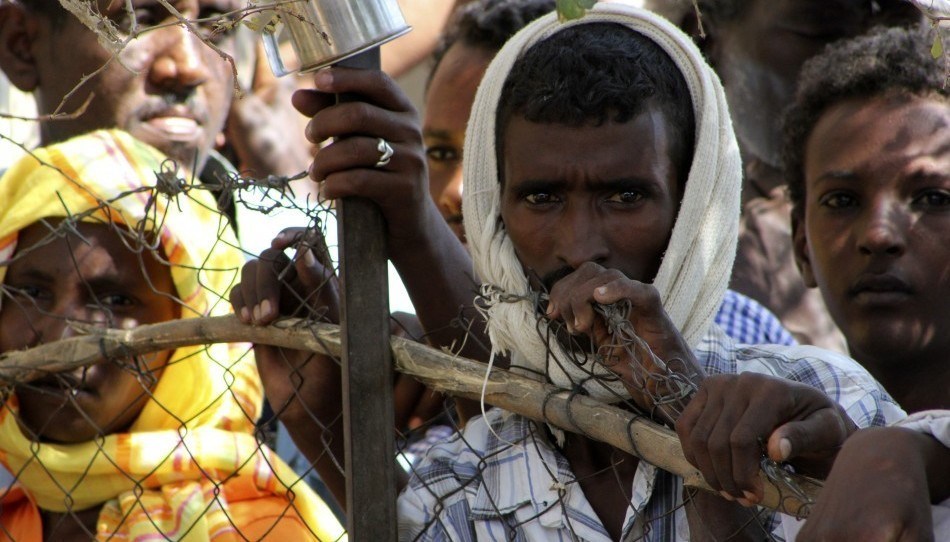It hits with a force of a thousand lightening bolts as homeostasis is broken and normal is shattered. Once love is abandoned and indifference grows between two who once were inseparable, the emptiness that remains runs deeper than oceans. The break happens in a flash but the pains happened a long time ago. In all honesty, they long forgot why they grew disenchanted. They just knew they could not co-exist so they decided to part ways instead of remaining together. Borders erected where none was found before; a relationship thick as blood became null and non-existent.
Perhaps this is normal; all things that are good come to an end and give way to division. Lack of communication and the inability to understand each others pains gives birth to indifference and eventually animus. Beyond the conflicts that existed at the surface, there were simmering frictions that made divorce unavoidable. It’s like a generational virus existed between the two; they both grew up in broken homes and their parents before them also resided in abodes that were mangled. It is said that love conquers all; but love is no match when it encounters embittered hearts and minds tainted with grievance.
Dissolution seemed like the only solution; they sought divergent paths in order to find happiness. But chasing individualism often ends in individual suffering; the bible says that two are better than one for if one falls the second will be there to pick her up and keep her warm. This wisdom is disregarded because they were trained to find singular attainment, a zeitgeist of self-pursuit leading them to find instant gratification alone instead of sticking it out together through the maelstroms that life brings. If only the two were made the better by themselves, instead both are hurting as their children miss their parents. They parted seeking independence only to give their hands to abject greed and wantonness.
Many have told them to make up, to get back together for the sake of the children and to find redemption in unity and love. But the dye is cast; can’t undo what was done because both parties think they have right on their side. Ego gets in the way of common sense, while the rest of the world is prospering by union, these two–and their neighborhood by extension–would rather go at it alone and suffer for that decision. The saddest part is that it’s their children who are feeling the brunt of this dissension, on both side of the divide once siblings now call each other by different names. These names breed exceptionalism which give way to yet more frictions; the generational animosity continues as the children pick up where their parents parted. Broken together now broken apart; everyone suffers because no one is willing to say I’m sorry.
This sounds like a story of a couple who broke up because they could not reconcile their differences. In reality, this is the story of Ethiopia and Eritrea that was inspired by Teddy Afro’s song “Fiyorina” (read about Teddy “Tikus” Afro). A friend once told me that “Fiyorina” was a song about the split that took place in 1994 between the two nations. Do not read this article as an advocacy of reconciliation for the sake of false unity; two people living in a home together might as well be living a thousand miles apart if they are unwilling to listen to each other and understand one another’s pains. What I want for both nations–really the whole continent of “Africa” and the world by extension–is to have forbearance and to stop seeing each other as enemies. We don’t have to live in the same homes to be family, we don’t have to be next to each other to be neighbors, nor do we have to be neighbors to have love for one another as humans.
We are all family; borders and flags can’t wash away the common blood we share in our veins. Fiyorina (flower) might bloom into two different roses but at the root we still are one people. The way to peace and prosperity is not by chasing secession and division; the more we are splintered, the more we allow others who are united to colonize us into submission. Togetherness and unity is the only way we can overcome a system of global oppression. We wait for the day to arrive where leaders can point us to the North Star of solidarity and collective enrichment. Failing that, if we follow the current paradigm and the despots who bleed the continent (read Dispensing Zenawi Injustice), a few among us will succeed while the mass majority get mired into hopelessness and hardship. Hello America and the rest of the world, I’m talking about you too.
Let me state something as a point of order. A long time ago, the continent of “Africa” was called Ethiopia. The modern day nation of Ethiopia used to be sadly called Abyssinia and before that went by her true name Axum until Emperor Haile Selassie changed the name of our nation to Ethiopia in the 1930’s. A quick side note, people need to stop being indoctrinated, Ethiopia is not a Latin word; the people of Ethiopia existed a thousand years before the Greeks formed their first city-state. Claiming Greeks named Ethiopia is akin to me claiming that I named my parents. We keep accepting the narratives of colonizers only to end up fighting each other instead of uniting as a people (read Bandira Reprecussions).
Ponder this for a moment; how many reading this article will pass this on to others compared to the number of people who rather share the garbage fed to us by those who indoctrinate us into ignorance and bury us into self-hatred. We live in the age of information where we have the ability to tell our stories instead of being fed lies and propaganda. Sadly too many use social media to share selfies and nothingness instead of using the platform to reclaim our stories and in the process wash away generations of lies that has been inculcated in our spirits. Generational curses go unbroken until we make a conscience decision to stop being enslaved mentally. All the protests and marches are useless and bankrupt if we don’t first free ourselves from within—90% of the struggle for freedom is internal but too many would rather fight externally.
 Let me go a bit further and see if cognitive dissonance can liberate us as a people. The continent of Ethiopia was renamed to Africa in order to honor a most despicable monster by the name of Scipio Africanus. Scipio subjugated the continent of Ethiopia by committing genocides the likes which would have given Hitler nightmares and shock trauma. The continent was renamed to honor this devil; the children of Ethiopia throughout the continent and the world call themselves African without understanding the root of this word—imagine if Jews went around calling themselves Hitlerian. This is the cyclical strife that has been passed on from parent to parent which is causing conflict between sisters and brothers. We keep chasing Sciopio while sipping colonial poison and wonder why we are dying. The children of Ethiopia (the continent) have been scattered; one day we will return to Zion when the time is chosen (read Prophecy 68:31).
Let me go a bit further and see if cognitive dissonance can liberate us as a people. The continent of Ethiopia was renamed to Africa in order to honor a most despicable monster by the name of Scipio Africanus. Scipio subjugated the continent of Ethiopia by committing genocides the likes which would have given Hitler nightmares and shock trauma. The continent was renamed to honor this devil; the children of Ethiopia throughout the continent and the world call themselves African without understanding the root of this word—imagine if Jews went around calling themselves Hitlerian. This is the cyclical strife that has been passed on from parent to parent which is causing conflict between sisters and brothers. We keep chasing Sciopio while sipping colonial poison and wonder why we are dying. The children of Ethiopia (the continent) have been scattered; one day we will return to Zion when the time is chosen (read Prophecy 68:31).
The divisions that splinter us are not just based on borders, boundaries, complexion and ideologies. Within the same nation and among the same people, too often petty differences get in the way of common achievements. Political rhetoric or factional movements are useless if we are not paying attention to the people first. Instead of focusing on development and material gains, we should be paying attention to the masses who suffer on either side of the border, throughout the continent and globally. Families broken by poverty, love shattered by boundaries, and humanity reduced by poverty, these are the things we need to fix instead of looking back at old maps and past achievements.
What I write about Ethiopia and Eritrea is not only applicable to my home nation or just the continent of Ethiopia—I no longer refer to the continent of humanity’s inception by its current name. At the core of what I write is a common theme that is applicable to my new home America and beyond. We are letting tribalism lead us into the abyss; we try to monopolize pains and all we get for our efforts is yet more anger and injustice. It does not hurt us any to be empathetic; our pains gain meaning when we unite with others who hurt like us instead of letting bitterness lead us to seek individual validation. Yasazenal means “it is sad” in Amharic; no need to cry over spilled wetet (milk)—let past hurt be past tense. Our parents divorced; the map of Ethiopia I remember as a child is no more. But we don’t have to follow the path of our ancestors and feed into yet more antipathy and discord. We don’t need reunion to find redemption; heal together or we will bleed separately. #Yasazenal
“Keep love in your heart. A life without it is like a sunless garden when the flowers are dead.” ~ Oscar Wilde
If you appreciate the message behind this write up and you too stand up for unity above division, share this article on social media using #Yasazenal
Check out the Ghion Cast below where I discuss how Ethiopia defeated colonialists by standing united together under one sendek alema (flag) and a determination to not give their hands to oppressors. In the same video, I discuss how unity overcame oppression in Haiti, America and beyond. Unity is the 5 stones that defeats oppressors. (make sure you check out Teddy Afro’s song Fiyorina below the Adwa video)
Check out the song below by Teddy Afro that inspired this article.
Check out the Ghion Cast below where I discuss Teddy Afro’s contribution to the music scene and what his new album means for unity and fiker (love).
To the continent of Ethiopia, the truth finds its way amid a century of deception.
Lij Teodrose Fikremariam
Originally from Ethiopia with roots to Atse Tewodros II, Lij Teodrose is a former community organizer whose writing was incorporated into Barack Obama's South Carolina primary victory speech in 2008. He pivoted away from politics and decided to stand for collective justice after experiencing the reality of the forgotten masses. His writing defies conventional wisdom and challenges readers to look outside the constraints of labels and ideologies that serve to splinter the people. Lij Teodrose uses his pen to give a voice to the voiceless and to speak truth to power.


